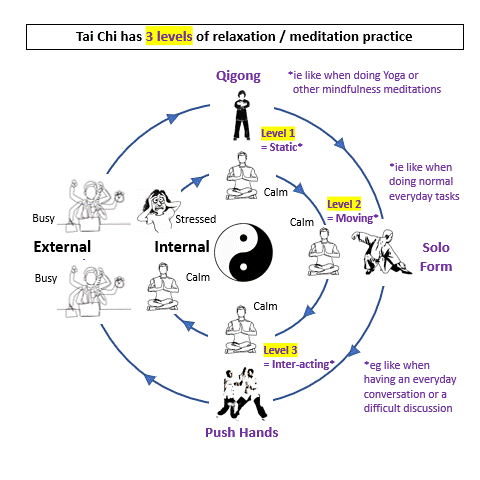
Authentic Tai Chi classes in
Welwyn and St Albans
HERTS School of T'ai Chi Ch'uan
Our Tai Chi has benefits for body and mind...
Originally practised for its martial arts applications, Tai Chi is now practised to support not only physical health, but also mental and emotional wellbeing.
Released Tension / Calmed Anxiety
= 'Relaxation' (in body & mind)
Relaxation is the primary aim of Tai Chi practice. Through the slow, focused, movements and breathing of Tai Chi, we intentionally release the many tensions we habitually hold in the muscles of our bodies. We also seek to release tension in our minds, by letting go unhelpful thoughts and negative emotions. This can make us feel calmer and less anxious - so more positive, or you could even say 'happier'.
Energy
= 'Qi' (Ch'i) / 'Vitality' / 'Health'
Regular practice builds what the Chinese call "Qi" (Ch'i) - often translated as "energy". The concept of Qi gives us a way to talk about how we experience energy in our body, either as a feeling of flow, or as a general feeling of vitality. Relaxation through Tai Chi increases overall vitality by reducing the energy wasted - in our bodies by tension in our muscles, and in our minds by anxiety. The movements of Tai Chi improve the flow and circulation of Qi within the body, bringing benefits to all our internal organs. The form, like breathing itself, involves a constant flow of energy between Yang and Yin (filling and emptying).
Strength
= 'Root'
Tai Chi is practised with relaxed uprightness, focusing on natural straightness from the top of the head to the tip of the tail bone. The uprightness comes from having both a connection to 'earth' (down / grounded) and a connection to 'heaven' (up / light). We can stand 'strong' like a tree - which is securely rooted in the earth, yet seems to have almost no weight in the branches reaching upwards. Cultivating this natural alignment is very good for the health of the spine, and we maintain it while doing Tai Chi by moving the whole body from our centre (the Tan Tien, pronounced "Don-Tee-Enn") as we shift our weight from 100% [rooted] in one foot to 100% [rooted] in the the other. This way of moving produces strength with stability. Medical research has shown that the strengthening from doing Tai Chi can have benefits for those with arthritis or osteoporosis.
Flexibility
= 'Happy hips'
The slow and smooth movements in Tai Chi are gentle on the joints, yet both strengthen and relax the muscles around them. This allows them to move more correctly / naturally - so the joint is open / loose and the movement is easy. Tai Chi movements particularly restore free movement to the hips, which reduces twisting of the knees - a common cause of knee damage.
Mindful Focus of Attention
= 'Awareness'
Most of us experience stress from everyday life. This stress not only impacts the body, it also makes it difficult to think clearly. We can become over-focused on anticipated problems in the future or actual problems in the past - both these distorting our perception of our present reality and causing us to over-react to day to day events or to other people's actions.
The practice of Tai Chi helps us to let go of unnecessary anxiety - to 'empty' our busy mind and simply be 'ok' in the present moment. This allows more awareness what is actually going on for ourselves and others, and also allows us to choose to respond calmly rather than simply react (or over-react) defensively. The benefits of Tai Chi in this regard are like those of mindfulness meditation, and many people do Tai Chi as a mindfulness practice.
Tai Chi is unique in having 3 levels of mindfulness meditation (& relaxation) practice. Solo practice becomes what mindfulness teachers and practitioners call a moving meditation. This aspect of Tai Chi becomes even more powerful in 'push hands' practice. No other practice is done in contact with another person. Yet that is when we most need mindfulness in real life.
These benefits mean T'ai Chi Ch'uan is a precious gift handed down to us - one that we are very happy to be able to pass on.
